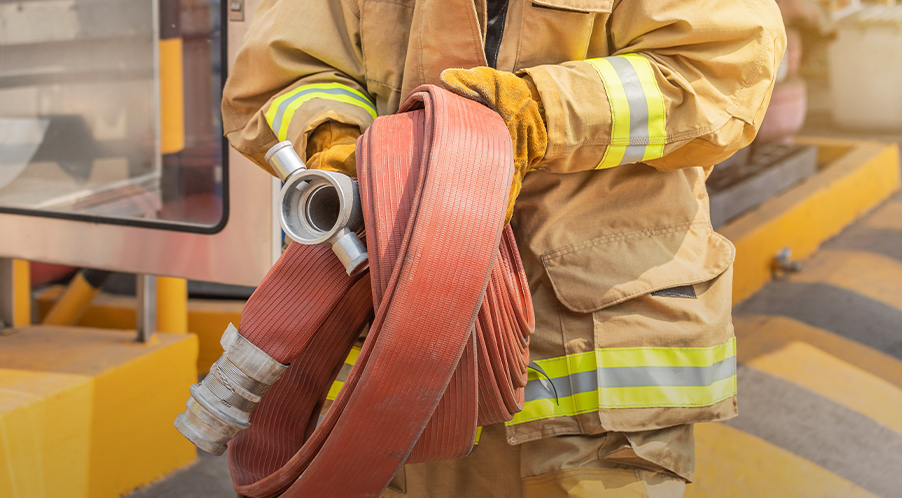
CALL US NOW
01937 842424 Available now, call us on:
01937 84 24 24
01937 84 24 24
Monday through Sunday, all day
Triton Security
Triton Security, North Wing, Thorp Arch Grange, Walton Road, Thorp Arch, Wetherby, West Yorkshire, LS23 7BA

In the world of fire safety and residential building management, few terms have become more urgent or more misunderstood than Waking Watch. Whether you’re managing a high-rise, overseeing a housing portfolio, or simply navigating regulatory changes, understanding Waking Watch isn’t just important, it’s essential.
At Triton Security, we’ve been protecting people and places since 2004. That includes being at the forefront of waking watch provision across the UK. In this article, we’ll break down what Waking Watch means, when it’s required, and how to stay compliant with the latest guidance, giving you the peace of mind that comes with knowing your residents are protected and your property is covered.
A Waking Watch is a temporary fire safety measure designed to protect residents in buildings where fire alarm systems are insufficient or where there is a known fire risk such as combustible cladding. Trained fire wardens carry out 24/7 patrols throughout the building, staying alert to signs of smoke, fire, or other hazards.
If danger is detected, they raise the alarm and ensure a safe and swift evacuation. Waking Watch is often used in buildings that are waiting for remediation works, like the installation of new fire alarms or removal of dangerous materials.
It’s not just a security service – it’s a life safety service.
The tragic events of Grenfell in 2017 put the spotlight on fire safety in high-rise buildings like never before. In the aftermath, thousands of buildings across the UK were found to have unsafe cladding, inadequate fire detection systems, or both.
In response, the government introduced guidance to ensure resident safety in the interim. This is where Waking Watch came in.
While it’s a temporary measure, the stakes are permanent. A well-managed Waking Watch can mean the difference between rapid evacuation and devastating loss. That’s why it’s vital to use an experienced, compliant provider.
The need for a Waking Watch is usually identified during a fire risk assessment (FRA) or following guidance from the local Fire and Rescue Service (FRS). You may be advised, or required, to implement a Waking Watch if:
This applies primarily to residential buildings, particularly those over 11 metres tall or with complex layouts that increase evacuation risk.
Triton’s waking watch officers are trained to deliver continuous fire safety monitoring that includes:
We operate in line with government guidance and NFCC (National Fire Chiefs Council) best practices to ensure your Waking Watch meets the latest standards.
While Waking Watch isn’t mandated by law in itself, it is required as a means of meeting your responsibilities under the Regulatory Reform (Fire Safety) Order 2005. This legislation puts a legal duty on the ‘responsible person’—usually the building owner or manager, to ensure the safety of residents.
In 2020, the NFCC published official guidance on simultaneous evacuation and Waking Watch services. It includes recommendations on:
Failing to meet these expectations could expose you to legal risk and leave your building non-compliant.
The costs of Waking Watch services vary depending on:
According to government data, some leaseholders in affected buildings have paid thousands per month in waking watch costs. This is a situation that has understandably led to frustration and media coverage.
At Triton Security, we take a different approach. We focus on transparency and efficiency. We even support you with remedial works and can propose and install tech-enabled solutions, including compliant fire detection systems.
With rising demand has come rising concern about quality. A number of media reports have highlighted cases of untrained staff, poor communication, and sky-high costs.
Here’s what to look for in a reputable provider:
At Triton, we go beyond ticking boxes. We provide smart, scalable, and safety-first solutions, backed by 20 years of frontline security and fire safety experience.
Waking Watch is an interim solution. It should remain in place only until more robust, long-term fire safety systems are installed; typically, a fully functional fire alarm with a simultaneous evacuation strategy.
The UK government has even launched the Waking Watch Replacement Fund to help building owners transition away from 24/7 patrols in favour of alarm systems. However, until those systems are installed and tested, Waking Watch remains essential.
While Waking Watch is focused on fire safety, it also plays a crucial role in residential building security. It’s about ensuring that the elderly tenant on the top floor feels safe. That young families don’t panic when a fire engine arrives outside. That your building meets its obligations without punishing your leaseholders.
Furthermore, regular patrols deter anti-social behaviour, identify maintenance issues early, and offer a visible presence that reassures residents.
Many of our clients choose to integrate fire safety services with CCTV monitoring, access control, and emergency response to create a comprehensive building safety solution.
Waking Watch isn’t just a line on a fire safety report, it’s about protecting lives. At Triton, we take that responsibility seriously.
Whether you manage a single block or a national portfolio, we’re here to support you with compliant, cost-effective Waking Watch services that put people first. If you’ve been advised to implement a Waking Watch, or you’re unsure whether your current cover is compliant, now’s the time to get clarity.
Need advice or a quote? Contact Triton Security today for a no-obligation fire safety assessment and find out how we can help you stay protected and compliant.